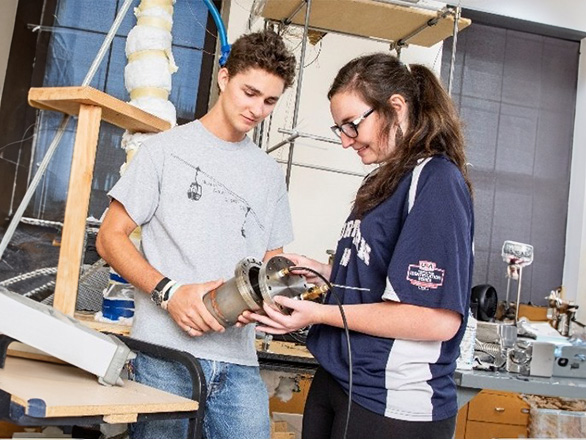The Graduate Certificate in Nuclear Packaging (GCNP) and the Graduate Certificate in Transportation Security and Safeguards (GCTSS) are the only nuclear-packaging-focused credentials offered by any accredited university. They help employers and organizations identify well prepared professionals in the fields. This page describes attributes that make the Nuclear Packaging Graduate Program (NPGP) uniquely valuable and links relevant media content.
Unique value of the Nuclear Packaging Graduate Program (NPGP)
Program graduates are highly satisfied

Kelly Hansen, Transportation Safety program manager in Argonne National Laboratory’s Nuclear and Waste Management division completed her GCNP in 2020. “… the practical knowledge I gained was invaluable.,” she said. “What attracted me to the program was the condensed nature of the courses — I could immediately advance my skills in support of Argonne’s activities in the transportation of Type B and fissile material packages.”

Megan Higley, Ph.D., a mechanical engineer at Pacific Northwest National Laboratory, completed her GCNP in 2022. “The certificate program in nuclear packaging is really unique — it’s like a combination of a seminar, a conference and a networking event, with the benefit of a university graduate credential at the end,” she said.
Required courses are taught by national laboratory subject matter experts
- Packaging University is a set of 21 one- and two-week in-person courses on all aspects related to Type B and fissile material package certification and is sponsored by the U.S. Department of Energy (DOE) Packaging Certification Program (PCP). The course titles are in the Nuclear Packaging Graduate Program courses list. These practice-based, hands-on courses are taught by subject matter experts using unique facilities at Argonne, Lawrence Livermore, Los Alamos, Oak Ridge, Pacific Northwest, Sandia and Savannah River national laboratories and other authorized locations.
- For both the GCNP and GCTSS, students are required to take four units of Packaging University classes over four non-contiguous weeks.
- The courses required for each certificate are chosen by a council of subject matter experts and hiring managers because they feel the classes are essential for the topic of the certificate.
Students choose electives based on their interests and needs
- For each graduate certificate, students choose five units of electives from the following choices: a variety of one- and two-unit Packaging University classes; a three-unit, semester-long mentored project students complete at their workplace; and/or a three-unit, semester-long online Introduction to Nuclear Packaging course offered by a University of Nevada, Reno faculty member.
- The project and online electives may be completed at the student’s workplace.
- Students earning both certificates may use four units from one certificate to satisfy electives from the other.
The program is accessible to working professionals
- Participants can earn either certificate with as few as four non-contiguous weeks away from their workplace. They can take up to six years to complete a certificate, but most participants complete them much more quickly.
In-person courses help participants build professional networks
- After each class, students can access the subject matter experts who teach the courses and the fellow professionals who take them.
- The resulting network can brainstorm when encountering future challenges.
Organizations can use the NPGP as a training program
- Organizations that support employees to complete certificates benefit from accelerated learning and access to subject matter experts.
- Having employees who have accredited university graduate certificates helps organizations gain credibility with their clients.
The graduate certificates are awarded by a university that is well known in the nuclear packaging sector
- Since 1993, the University of Nevada, Reno Nuclear Packaging Laboratory (NPL) has performed nuclear packaging research funded by the DOE and the Nuclear Regulatory Commission (NRC).
- Several of the lab’s graduates have worked or interned at national laboratories and nuclear services companies.
NPGP students and alumni have access to a job board that lists related opportunities
- Nuclear packaging, transportation security and safeguards and related industry have an opportunity to list employment and internships on a searchable curated database.
- NPGP students and alumni with a valid University of Nevada, Reno email address will gain access to this unique database.